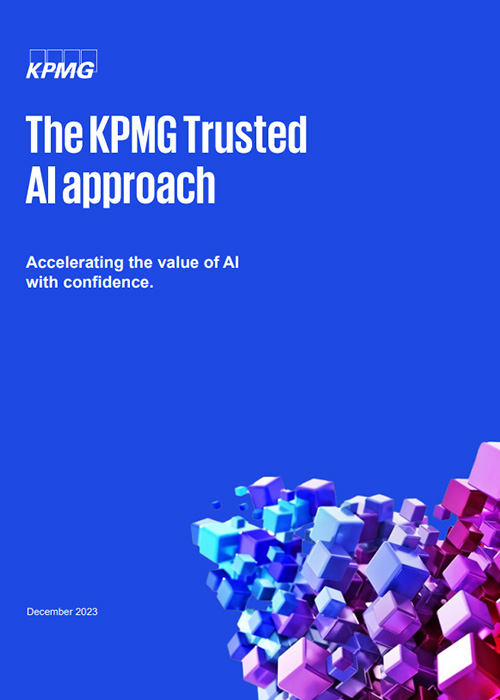Accelerate the value of generative AI with confidence
Artificial intelligence (AI) is transforming the world in which we live—impacting many aspects of everyday life, business and society. KPMG Member Firms help organizations utilize the transformative power of AI, including its ethical and responsible use.
As KPMG harnesses the power of AI and accelerates adoption, we recognize that advanced technologies can introduce complexity and AI risks that should be addressed clearly and responsibly.
Throughout the global organization, we are committed to upholding ethical standards for AI solutions that align with our values and professional standards, and that foster the trust of KPMG clients, people, communities and regulators. We are steadfast in our commitment to act in a way that serves the public interest, honors public trust and demonstrates our commitment to professional excellence.
KPMG Trusted AI is our strategic approach and framework to designing, building, deploying and using AI strategies and solutions in a responsible and ethical manner so we can accelerate value with confidence.
Keep reading to discover our principles, ethical pillars and governance.
The KPMG Trusted AI principles
What we aim to do
Throughout the KPMG global organization, our approach to Trusted AI includes foundational principles that guide our aspirations in this space, demonstrating our commitment to using it responsibly and ethically:
Values-driven
We implement AI as guided by our Values. They are our differentiator and shape a culture that is open, inclusive and operates to the highest ethical standards. Our Values inform our day-to-day behaviours and help us navigate emerging opportunities and challenges.
Human-centric
We prioritize human impact as we deploy AI and recognize the needs of our clients and our people. We are embracing this technology to empower and augment human capabilities — to unleash creativity and improve productivity in a way that allows people to reimagine how they spend their days.
Trustworthy
We will adhere to our principles and the ethical pillars that guide how and why we use AI across its lifecycle. We will strive to ensure our data acquisition, governance and usage practices upholds ethical standards and complies with applicable privacy and data protection regulations, as well as any confidentiality requirements.
We recognize that the field of AI is rapidly evolving — and so is our approach. As the technology advances and legal, ethical, risk and regulatory standards mature, we will continue to review and evolve our approach as necessary.
KPMG's Trusted AI framework is how we drive principles into practice
Click to interact
Reliability
AI solutions should consistently operate in accordance with their intended purpose and scope and at the desired level of precision.
Security
Robust and resilient practices should be implemented to safeguard AI solutions against bad actors, misinformation or adverse events.
Safety
AI solutions should be designed and implemented to safeguard against harm to people, businesses and property.
Privacy
AI solutions should be designed to comply with applicable privacy and data protection laws and regulations.
Sustainability
AI solutions should be designed to be energy efficient, reduce carbon emissions and support a cleaner environment.
Explainability
AI solutions should be developed and delivered in a way that answers the questions of how and why a conclusion was drawn from the solution.
Integrity
Data used in AI solutions should be acquired in compliance with applicable laws and regulations and assessed for accuracy, completeness, appropriateness and quality to drive trusted decisions.
Transparency
AI solutions should include responsible disclosure to provide stakeholders with a clear understanding of what is happening in each solution across the AI lifecycle.
Fairness
AI solutions should be designed to reduce or eliminate bias against individuals, communities and groups.
Accountability
Human oversight and responsibility should be embedded across the AI lifecycle to manage risk and comply with applicable laws and regulations.











